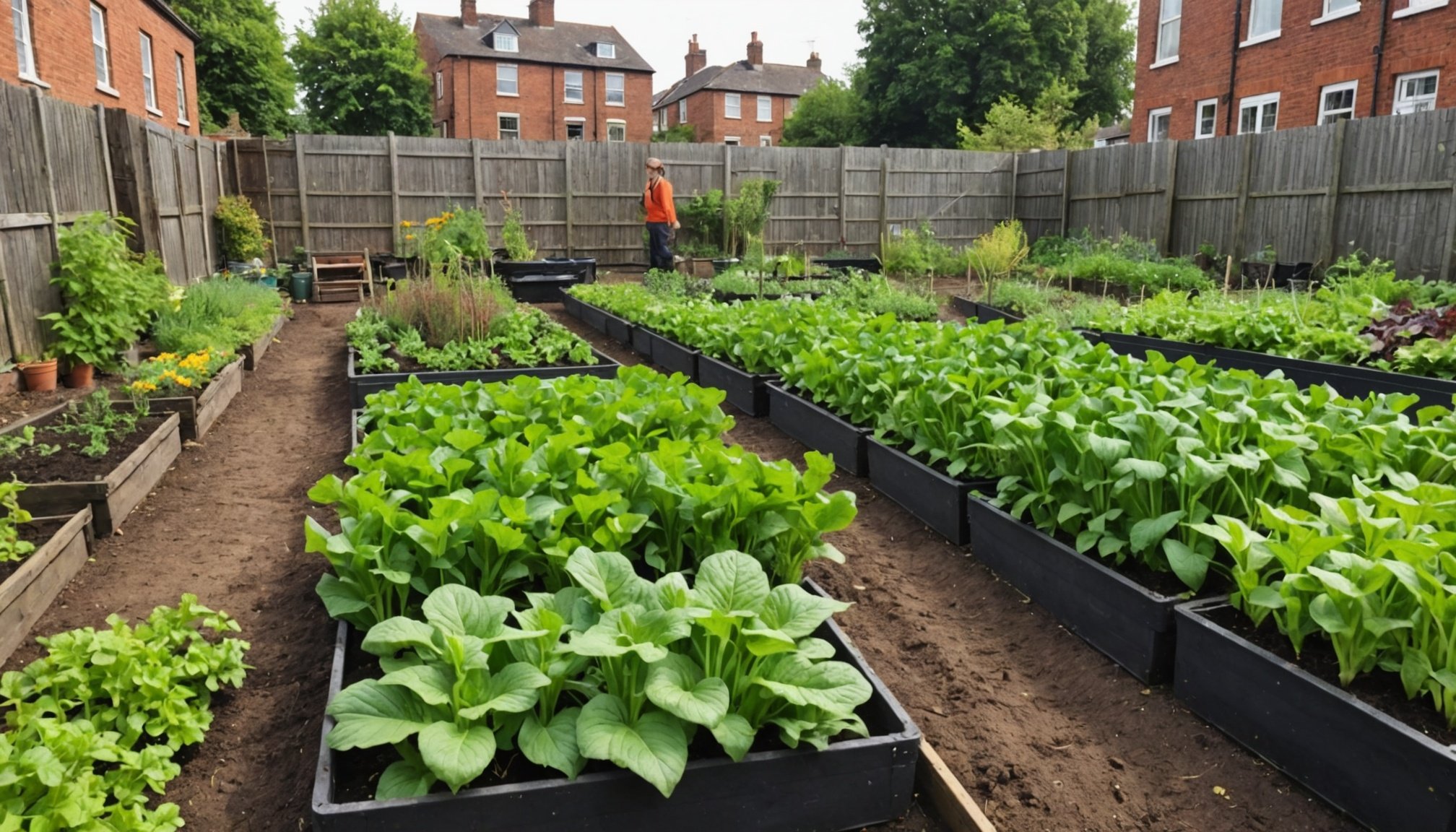Understanding Urban Gardening in the UK
Urban gardening in the UK has blossomed into a popular hobby for many city dwellers. By utilising small spaces efficiently, such as balconies, rooftops, and community gardens, individuals can enjoy the benefits of growing their own plants even in heavily populated areas. Urban gardening not only enhances green spaces but also promotes mental well-being and fresh, homegrown produce.
There are several types of urban gardens suitable for the UK environment. Container gardens, which use pots and other containers to grow plants, are a great option for beginners. They allow for easy mobility and do not require much space. Raised beds provide another solution, especially useful for those with limited soil access and help manage gardening regulations concerning soil contamination.
Topic to read : Establishing a successful organic food marketplace in the uk: your essential guide to navigating local health regulations
Familiarity with key concepts and terminology in urban gardening can make the transition smoother for beginners. Understanding terms such as composting, which involves decomposing organic material to enrich the soil, or companion planting, where specific plant pairings improve growth, are essential. With the right tips, the journey of urban gardening can be rewarding and sustainable, paving the way for a greener city lifestyle.
Local Farming Regulations
Navigating the farming regulations landscape, especially within urban environments, is essential for garden enthusiasts. Local laws are in place to guide and protect not just the growers but also the community and the environment.
Also read : Navigating uk import rules: essential strategies for starting your gourmet food business
Overview of Local Regulations
Local laws concerning farming and gardening can vary dramatically based on the region. They dictate what can be grown, where it can be grown, and under what conditions. These regulations often address soil safety, pesticide usage, and water management, designed to promote sustainable and safe urban gardening practices.
Importance of Compliance
Adhering to these gardening compliance standards ensures that urban gardeners contribute positively to their communities. Non-compliance can lead to legal consequences and adversely affect public health and the environment. By staying informed on local laws, garden enthusiasts can cultivate responsibly without legal hindrance.
Common Misconceptions
Misunderstandings about gardening regulations are common. Many believe that urban homeowners can garden as they please, without considering the impact on neighbors or local economies. Another misconception is that these regulations stifle creativity, when in reality, they aim to ensure safety and sustainability, fostering a harmonious balance between individual and community interests. Understanding these urban regulations is crucial for any aspiring gardener.
Zoning Laws and Permits
Navigating zoning laws and obtaining proper permits for urban gardening can be a challenging process. Zoning laws vary significantly depending on location, but they typically dictate what types of activities are allowed in certain areas. For urban gardening, understanding these regulations is crucial to ensuring that your efforts are legal and compliant.
To begin, visit your local municipality’s website or planning office to identify the zoning classification for your area. Most urban zones will have specific guidelines around gardening approvals, detailing what can be planted and where. If you’re uncertain, it’s wise to consult with a local expert or attorney experienced in zoning issues.
Once zoning implications are understood, the next step is obtaining any necessary permits. This often involves submitting an application with detailed plans of your intended garden. Authorities may require inspections to verify the proposed site’s compliance with local ordinances.
Ignoring these zoning laws can lead to significant penalties. Non-compliance may result in fines, mandated removal of plants, or even legal action. Therefore, being proactive and ensuring you have all required approvals helps avoid these potential pitfalls. Adhering to these guidelines ultimately offers peace of mind and secures the sustainability of your urban gardening endeavours.
Resources for Urban Gardeners
Whether you’re a seasoned gardener or new to urban gardening, having access to the right gardening resources is essential for success. These tools and platforms offer support for gardeners at every level, empowering individuals to cultivate their urban spaces effectively.
Local Gardening Organizations
Identifying local organizations that support urban gardening can significantly enhance your journey. These groups often provide workshops and seminars to educate gardeners about the best practices and latest trends in urban gardening. They can be a treasure trove of knowledge, offering advice tailored to your specific climate and soil conditions.
Online Resources and Tools
Thanks to the internet, a wealth of online resources and tools are at your fingertips. Recommended platforms provide advice on everything from plant selection to community gardening tips. Websites and apps help track plant growth, offer troubleshooting tips, and even connect gardeners with similar interests across the globe.
Community Gardening Initiatives
Community gardening initiatives play a vital role in supporting urban gardening efforts. They foster a sense of community while also providing support for gardeners by sharing tools, seeds, and knowledge. Such initiatives transform vacant lots into vibrant gardens, enhancing the urban landscape and providing fresh produce. If you’re looking to get involved, community gardens are an excellent way to meet fellow gardening enthusiasts and learn collectively.
Practical Advice for Urban Gardening
Urban gardening offers a fantastic opportunity to create green spaces in bustling cities. To get started with effective gardening, consider selecting containers that fit your available space – balconies, rooftops, or windowsills. Choose plants that thrive in urban environments, like herbs, tomatoes, or even microgreens. Implementing sustainable practices is crucial. Reusing materials, such as recycled pots, and harnessing rainwater for irrigation, reduces your environmental impact.
Effective Gardening Tips
Creating a productive urban garden requires meticulous planning and adaptability. Account for vertical space with trellises and hanging pots. Soil quality can dramatically affect plant health, so use nutrient-rich compost. Engage in sustainable practices by using organic fertilisers and pesticides, enhancing soil health without chemicals.
Overcoming Urban Gardening Challenges
Limited sunlight and space are typical obstacles in urban gardening. Position plants where they’ll receive adequate natural light, or employ grow lights during shorter days. Urban gardening tips include regularly checking for pests, which tend to proliferate in confined spaces. Consider companion planting techniques to naturally deter them and promote plant growth. Adopting these practices facilitates a thriving garden, even in the heart of the city.
Visual Aids and Additional Resources
Understanding urban gardening can be significantly enhanced with the right gardening visuals and instructional materials. Here’s a breakdown of how different resources can support your learning journey.
Infographics and Charts
Urban gardening may seem overwhelming at first, but infographics and charts can simplify complex processes. These visuals illustrate essential concepts like soil layers, plant spacing, and watering schedules in an easy-to-digest manner. They provide quick, at-a-glance information that can improve comprehension and recall.
Recommended Books and Guides
For those seeking in-depth knowledge, several recommended books and guides offer comprehensive insights into urban gardening. Titles like “The Urban Gardener” and “Gardening for Beginners” are perfect for both novice and experienced gardeners looking to enhance their skills. These books often include step-by-step instructions, illustrative materials, and expert advice.
Links to Authoritative Sources
For readers interested in conducting further research, links to authoritative online sources can be invaluable. Resources like university agricultural extensions and government gardening sites provide credible, up-to-date information. They can answer nuanced questions, offer advanced techniques, and help in troubleshooting gardening issues. These sources are curated to provide reliable and detailed content to deepen your gardening knowledge.











